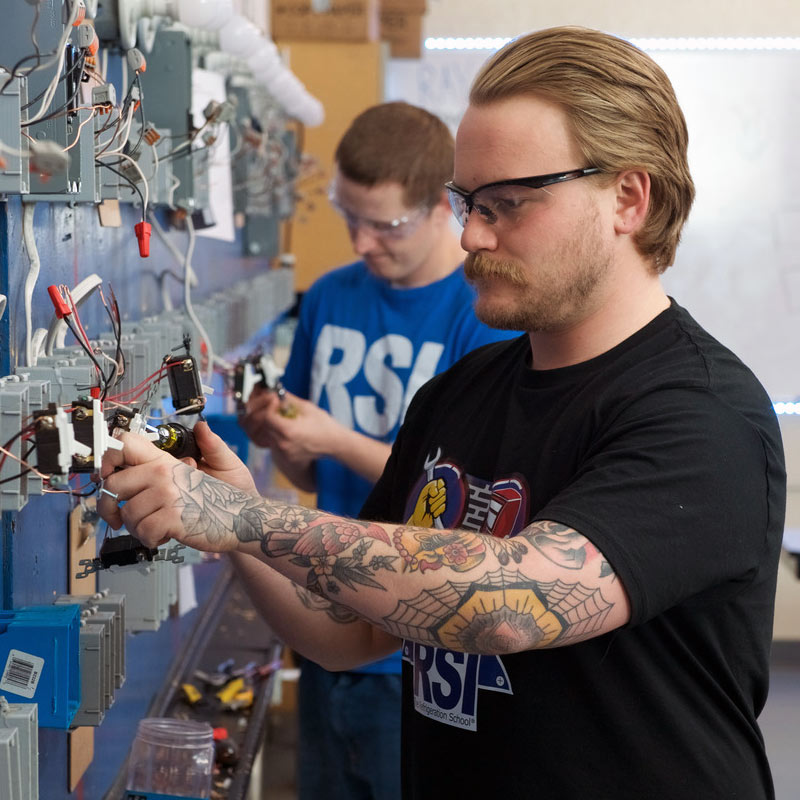Updated: 02/28/2024
HVAC technicians service heating, ventilation and air conditioning systems. Those who work on refrigeration equipment as well are called “HVAC/R technicians.”
The work of HVAC technicians can be crucial for everything from keeping families cool on sweltering summer days, to providing school children with clean indoor air, and even ensuring the safe storage and transport of medicine, food and perishable goods.1 In fact, improving the availability of proper refrigeration could even help fight global hunger.2
SECTION 1
HVAC Technician Job Description
Knowing what an HVAC technician does starts with understanding the equipment he or she works on. So, what exactly does “HVAC” mean?
HVAC is one of the most commonly used acronyms in the heating and cooling industry. It’s an acronym for “heating, ventilation and air conditioning,” which describes the three main functions that are often combined into one system in modern homes and commercial buildings. Often, it is written HVAC/R, which includes refrigeration.3
In an HVAC system, warmed, cooled and/or dehumidified air flows through a series of tubes (or ducts) and is distributed to all of the rooms of the building or home.3
Similar to air conditioners, refrigerators rely on the science of refrigeration to lower temperatures. One of the main differences between A/C units and refrigerators is what’s being cooled: as the name suggests, air conditioners maintain the temperature of air; refrigerators cool or freeze products, usually food.4
The HVAC/R technician’s job is to install, maintain and repair such systems. In some cases, a tech may specialize in one type of equipment, such as commercial refrigeration or radiant heating.1
Read our HVAC Technician Career Overview for an in-depth look at this profession.
SECTION 2
What Are the Duties of an HVAC Technician?
Daily tasks can depend on the type of HVAC career or job one has, but generally, technicians may have the following responsibilities.
System Installation
HVAC technicians may benefit from knowledge of blueprints, models and technical drawings. This knowledge could come in handy when installing HVAC equipment, wiring and machines.5
They may also need to know how to properly install electrical wiring and be able to test whether the electronic parts are working correctly.1,5 However, on larger projects where workers are covered by union contracts, such work may be reserved for specialized tradespeople:1
- Sheet metal workers
- Electricians
- Plumbers
- Pipefitters and steamfitters
- Boilermakers1
Equipment Maintenance and Repair
In addition to testing the electrical components, HVAC technicians may be responsible for running diagnostics on the overall system, troubleshooting basic HVAC problems and performing regular maintenance to prolong the lifespan of the equipment. This includes examining individual parts of the system to see if there are any components that have become worn or defective, and then replacing them.5
Refrigerant Record keeping
Lastly, HVAC technicians must adhere to government refrigerant regulations concerning the recovery, conservation and recycling of these substances. This includes following rules for the handling and disposal of pressurized gases and fluids and keeping records of the work they perform.1
SECTION 3
What Tools and Equipment Do HVAC Technicians Use?
A variety of tools and equipment are employed to service HVAC/R equipment and keep technicians safe on the job.
HVAC Technician Tools
- Vacuum pump
- Voltage tester and multimeter
- Reciprocating saw blades
- Tin snips and shears
- Refrigerant scale
- Pipe wrenches and pliers
- Screwdrivers
- Cordless drill6
- Electrical test equipment6
HVAC Technician Safety Gear
- Steel-toed work boots
- Full-coverage clothing like long pants and long-sleeved shirts
- Heavy gloves
- Hard hat
- Safety glasses or goggles
- Face shield
- Respiration gears
- Earplugs7
SECTION 4
A Day in the Life of an HVAC Technician
While daily responsibilities and duties can, of course, vary depending on where an HVAC technician works, the following example may be representative of a tech who makes service calls to homes and businesses, or what’s known in the field as the residential and commercial HVAC sectors. HVAC technicians may also ply the trade in industrial settings like factories.
Keep in mind, though, that even for these techs, one day can differ greatly from the next, with variety being the only constant.8
Work Schedule
When an HVAC tech comes into work in the morning, he or she must be prepared to do whatever job is needed.
A “typical day” may start with a big installation job, in which the technician must first determine the best location to place the air conditioner. Next, they would be busy connecting pumps and supply lines for fuel and water, as well as electrical wires. The tech would then test the system to ensure everything is working properly.9
Additional service calls throughout the day could have the technician repairing a commercial refrigeration system at a deli, maintaining the air conditioning units of a handful of homes and running an efficiency check on a small business’ HVAC equipment.9
Working Conditions and Environments
Throughout the day, the HVAC technician may walk, stand and sit. Working conditions can change based upon the job site. Sometimes the climate is pleasant. Other times, working quarters are cramped or outside in inclement weather.10
Safety precautions are usually necessary, especially when working with the electrical components of HVAC units.10
Communication is often part of the job, and face-to-face discussions can be common. These conversations may be with customers, making knowledge of customer service principles and processes important. Being able to evaluate customer satisfaction can also be helpful.5
After the tech completes his or her job roster, the work day is over. Usually, HVAC techs work at least 8-hour days, depending on the employer and the number of jobs scheduled on any given shift. The number of specific jobs per day can be variable and may be quite higher during peak heating and cooling seasons, when techs often work overtime and irregular hours.10
SECTION 5
How Long Does It Take to Become an HVAC Technician?
The time it takes to become an HVAC technician can depend on the specific path one takes to the career. Below are some common steps and their time frames:
Step 1: Earn a High School Diploma or GED (4 Years or Less)
The Bureau of Labor Statistics (BLS) indicates that many employers these days prefer to hire applicants with a post-secondary education, such as from a trade school, or who have completed an apprenticeship.11
Usually, such institutions, along with many employers, require individuals to have a high school diploma or GED.12
Step 2: Complete an HVAC Training Program (7 Months to 2 Years)
It’s common for HVAC technicians to receive formal training in heating, air conditioning and refrigeration from community colleges, technical institutions or HVAC schools.11
Alternatively, some technicians train for the trade via an apprenticeship, which can last from 3 to 5 years.11
Step 3: Obtain EPA Certification (2 to 3 Weeks)
The Environmental Protection Agency (EPA) requires technicians who buy, handle or work with refrigerants to be certified in how to handle them properly.11
The certification process involves taking at least two closed book, multiple-choice exams: the core requirements test and at least one of the tests for the three types of certification available. Exams can be taken online or at an HVAC distributor location, and 18 of the 25 questions on each test must be answered correctly.13
Taking the test in the core requirements and all three types of EPA certification can take two hours. Individuals typically receive test results within 2 to 3 weeks.14
Step 4: Become Licensed with Your City or State (Varies)
In some states and cities, HVAC technicians must be licensed. HVAC technician certification and licensing requirements and process times can vary by location.11
SECTION 6
Do HVAC Technicians Make Good Money?
HVAC technicians can earn healthy wages. In 2020, they had a median annual salary of $50,590 and an hourly median wage of $24.32. However, how much an HVAC tech earns can vary with location and industry, so some of these tradespeople earn more than this amount and some less.15*
SECTION 7
Is HVAC a Good Career?
Is HVAC a good career for you?
As illustrated above, the career of an HVAC technician can bring daily variety when it comes to job duties and locations. Becoming an HVAC technician can take less time than other career paths that require spending 4 years in college to earn a bachelor’s degree. And HVAC technicians play an important role in keeping people comfortable and healthy.
If all of these qualities appeal to you, then a career in heating, ventilation, air conditioning and refrigeration service and repair may be the right fit.
*Phoenix Area’s annual mean wage is $50,070 for Heating, Air Conditioning, and Refrigeration Mechanics and Installers (499021) reported by BLS as of May 2020 http://data.bls.gov/oes.
Average starting salary for Refrigeration Technologies is $35,670 for RSI graduates employed during the 12 month period of 7/1/19-6/30/20.

Have Questions?
A team of advisors is available to answer questions you may have.
M – Th: 7AM – 7:30PM (PST)
F: 7AM – 4PM (PST)
Sat: 8AM – 12PM (PST)
Additional Sources
1. https://www.bls.gov/ooh/installation-maintenance-and-repair/heating-air-conditioning-and-refrigeration-mechanics-and-installers.htm#tab-2
2. https://blogs.worldbank.org/climatechange/how-financing-sustainable-cooling-can-buffer-our-food-system
3. https://www.hvac.com/faq/what-is-hvac/
4. https://clubtechnical.com/refrigerator-air-conditioner
5. https://www.onetonline.org/link/summary/49-9021.01
6. https://www.smartservice.com/smart-service-blog/hvac-service-tech-tool-list/
7. https://www.contractingbusiness.com/residential-hvac/5-important-safety-guidelines-new-hvac-technicians
8. https://hvaccareernow.com/articles/a-day-in-the-life-of-an-hvac-technician
9. https://hvactraining101.com/describing-a-typical-hvac-day/
10. https://www.bls.gov/ooh/installation-maintenance-and-repair/heating-air-conditioning-and-refrigeration-mechanics-and-installers.htm#tab-3
11. https://www.bls.gov/ooh/installation-maintenance-and-repair/heating-air-conditioning-and-refrigeration-mechanics-and-installers.htm#tab-4
12. https://study.com/articles/Why_Should_You_Earn_Your_High_School_Diploma.html
13. https://work.chron.com/prepare-epa-certification-tests-24388.html
14. https://www.aireco.com/wp-content/uploads/2016/04/EPA-Testing-FAQs-Laurel-Arlington.pdf
15. https://www.bls.gov/ooh/installation-maintenance-and-repair/heating-air-conditioning-and-refrigeration-mechanics-and-installers.htm#tab-1

